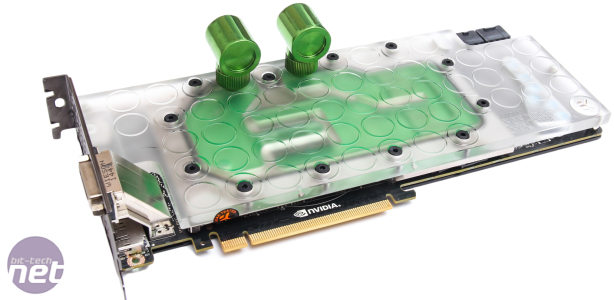
Performance Analysis
It's an interesting set of numbers and once again we're presented with the fact that water-cooling your Titan X does wonders for cooling. Whether at stock speed or overclocked, the margin between the air-cooled stock card and strapping the EK waterblock to it was huge - over 40°C in fact. The obvious benefit here is that with two 140mm fans spinning at near silent levels, the water-cooled system was a huge amount quieter than the Titan X's stock cooler, although the latter was far from hideously loud, even under load.Interestingly, the thermals did increase the further up the spectrum we went in terms of overclocking for both setups and by a similar amount too. The first step up was to max-out the power and thermal targets using EVGA's PrecisionX overclocking tool. This saw a 1°C jump in both systems. Moving on from there, applying our standard overclock of 190MHz to the core and 350MHz to the memory, the water-cooled card remained at a delta T of 17°C under load, while the air-cooled card rose 2°C.
In terms of the raw overclock, we were able to squeeze a little more out of the Titan X once it was water-cooled, adding a further 25MHz to the GPU core, resulting in a stated boost frequency of 1,291MHz. This saw the maximum delta T reached in the water-cooled system of 18°C - just 2°C above the stock speed temperature.
Click to enlarge
The Unigine Valley numbers were far less dramatic. The biggest differences were at the bottom end of the scale, where at stock speed and when the maximum power and thermal targets were applied, the Titan X was a little faster under water than it was with the air cooler. Stock speed saw the biggest difference, with over300 points gained just by water-cooling the card, although this equates to less than 7 per cent in performance terms. Once we'd overclocked the card, there was very little between the numbers, and the extra overclock only yielded another 140 points or so.
Conclusion
In performance terms, if you're content with your typical software overclocking tools such as EVGA's PrecisionX, there's little reason to water-cool the Titan X. Yes, there was a noticeable difference at stock speed, but once you'd overclocked it, the difference became far less tangible.We'd imagine that most people lucky enough to own a Titan X would probably water-cool it if they were able to if only for aesthetic reasons. However, there's definitely a case for doing so to reduce noise. We obtained a 40°C lower delta T using a couple of quiet fans and a modest water-cooling setup, and this was enough to utterly trounce the stock cooler in noise and cooling. That said, the Titan X is far from noisy under load so if the rest of your system is air-cooled, it won't pose too much of an issue.

MSI MPG Velox 100R Chassis Review
October 14 2021 | 15:04









Want to comment? Please log in.